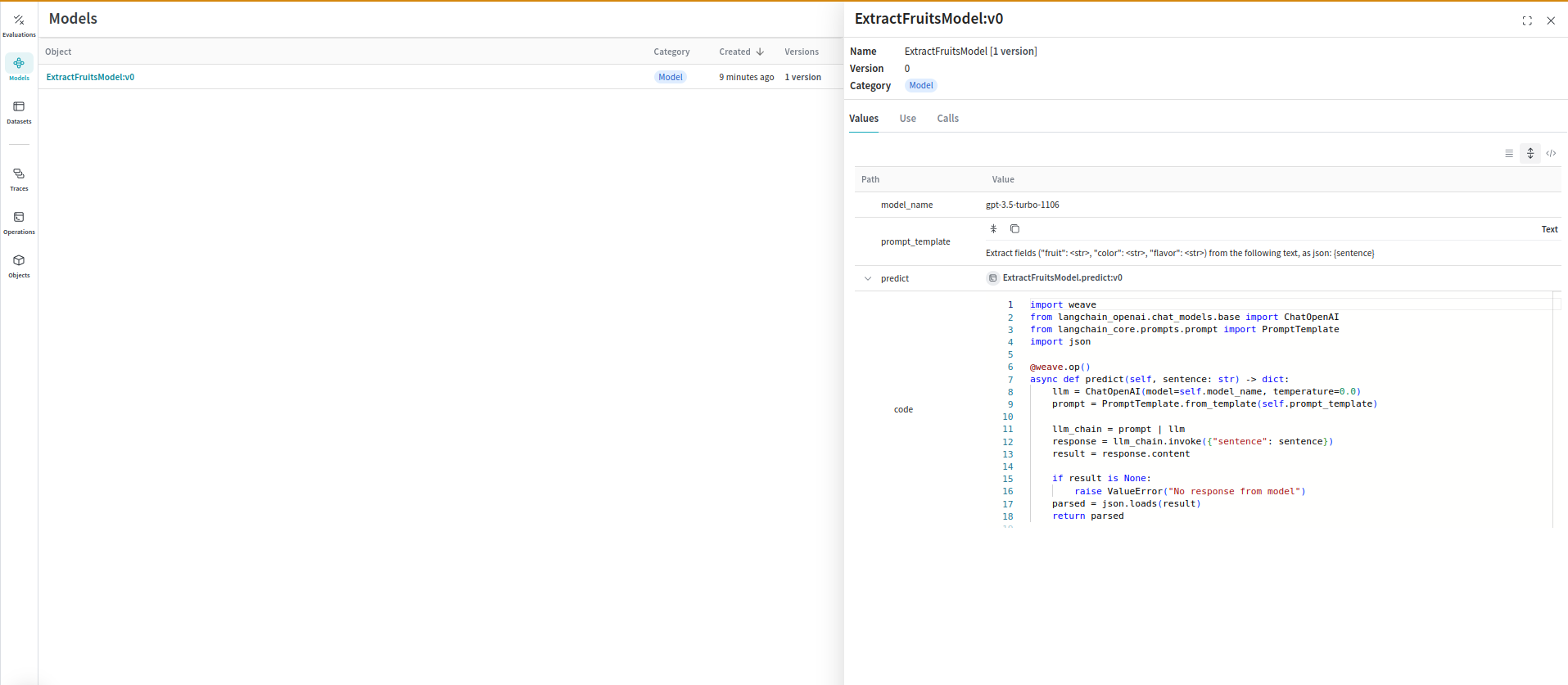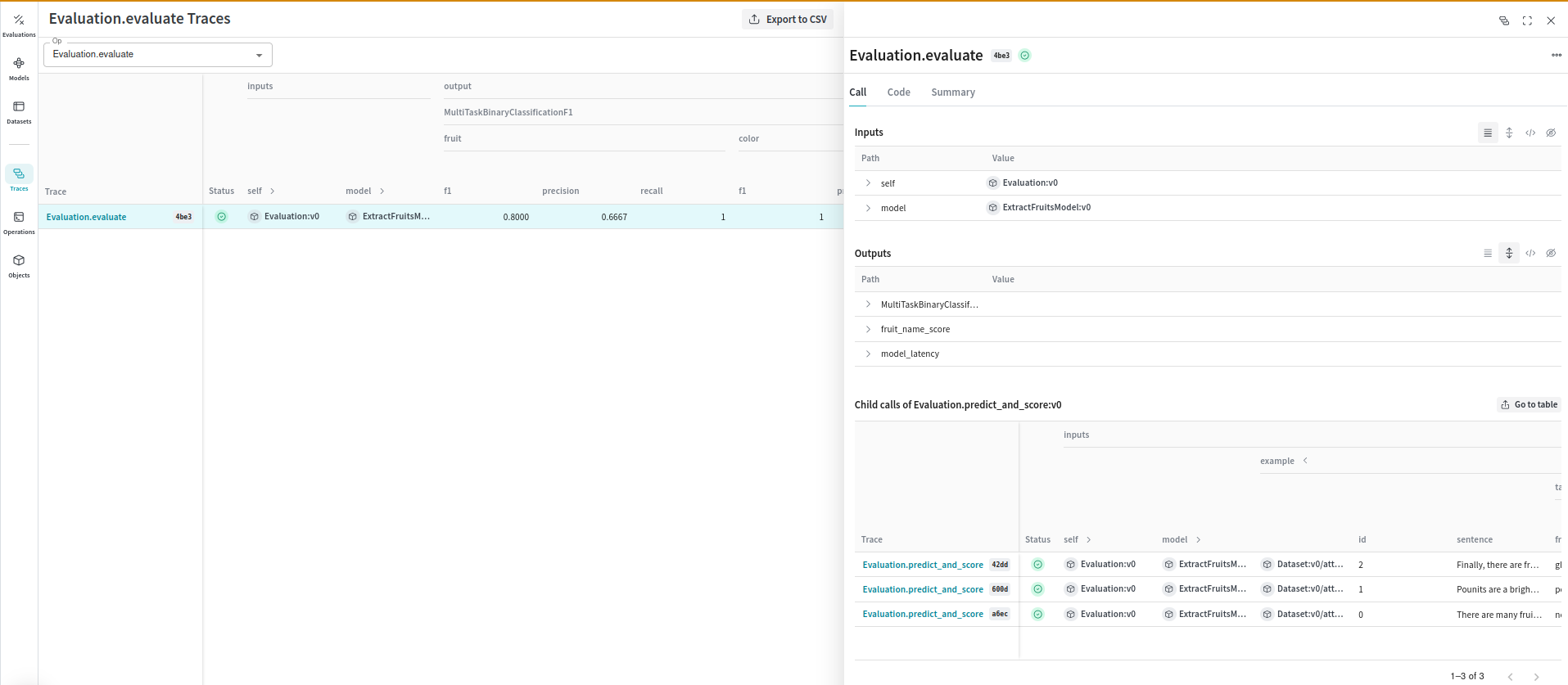LangChain
Weave is designed to make tracking and logging all calls made through the LangChain Python library effortless.
When working with LLMs, debugging is inevitable. Whether a model call fails, an output is misformatted, or nested model calls create confusion, pinpointing issues can be challenging. LangChain applications often consist of multiple steps and LLM call invocations, making it crucial to understand the inner workings of your chains and agents.
Weave simplifies this process by automatically capturing traces for your LangChain applications. This enables you to monitor and analyze your application's performance, making it easier to debug and optimize your LLM workflows.
Getting Started
To get started, call weave.init() at the beginning of your script. The argument in weave.init() is a project name that will help you organize your traces. If you don't specify a W&B team when you call `weave.init()`, your default entity is used. To find or update your default entity, refer to [User Settings](https://docs.wandb.ai/guides/models/app/settings-page/user-settings/#default-team) in the W&B Models documentation.
import weave
from langchain_core.prompts import PromptTemplate
from langchain_openai import ChatOpenAI
# Initialize Weave with your project name
weave.init("langchain_demo")
llm = ChatOpenAI()
prompt = PromptTemplate.from_template("1 + {number} = ")
llm_chain = prompt | llm
output = llm_chain.invoke({"number": 2})
print(output)
Tracking Call Metadata
To track metadata from your LangChain calls, you can use the weave.attributes context manager. This context manager allows you to set custom metadata for a specific block of code, such as a chain or a single request.
import weave
from langchain_core.prompts import PromptTemplate
from langchain_openai import ChatOpenAI
# Initialize Weave with your project name
weave.init("langchain_demo")
llm = ChatOpenAI()
prompt = PromptTemplate.from_template("1 + {number} = ")
llm_chain = prompt | llm
with weave.attributes({"my_awesome_attribute": "value"}):
output = llm_chain.invoke()
print(output)
Weave automatically tracks the metadat against the trace of the LangChain call. You can view the metadata in the Weave web interface as shown below:
Traces
Storing traces of LLM applications in a central database is crucial during both development and production. These traces are essential for debugging and improving your application by providing a valuable dataset.
Weave automatically captures traces for your LangChain applications. It will track and log all calls made through the LangChain library, including prompt templates, chains, LLM calls, tools, and agent steps. You can view the traces in the Weave web interface.
Manually Tracing Calls
In addition to automatic tracing, you can manually trace calls using the WeaveTracer callback or the weave_tracing_enabled context manager. These methods are akin to using request callbacks in individual parts of a LangChain application.
Note: Weave traces Langchain Runnables by default and this is enabled when you call weave.init(). You can disable this behaviour by setting the environment variable WEAVE_TRACE_LANGCHAIN to "false" before calling weave.init(). This allows you to control the tracing behaviour of specific chains or even individual requests in your application.
Using WeaveTracer
You can pass the WeaveTracer callback to individual LangChain components to trace specific requests.
import os
os.environ["WEAVE_TRACE_LANGCHAIN"] = "false" # <- explicitly disable global tracing.
from weave.integrations.langchain import WeaveTracer
from langchain_core.prompts import PromptTemplate
from langchain_openai import ChatOpenAI
import weave
# Initialize Weave with your project name
weave.init("langchain_demo") # <-- we don't enable tracing here because the env var is explicitly set to `false`
weave_tracer = WeaveTracer()
config = {"callbacks": [weave_tracer]}
llm = ChatOpenAI()
prompt = PromptTemplate.from_template("1 + {number} = ")
llm_chain = prompt | llm
output = llm_chain.invoke({"number": 2}, config=config) # <-- this enables tracing only for this chain invoke.
llm_chain.invoke({"number": 4}) # <-- this will not have tracing enabled for langchain calls but openai calls will still be traced
Using weave_tracing_enabled Context Manager
Alternatively, you can use the weave_tracing_enabled context manager to enable tracing for specific blocks of code.
import os
os.environ["WEAVE_TRACE_LANGCHAIN"] = "false" # <- explicitly disable global tracing.
from weave.integrations.langchain import weave_tracing_enabled
from langchain_core.prompts import PromptTemplate
from langchain_openai import ChatOpenAI
import weave
# Initialize Weave with your project name
weave.init("langchain_demo") # <-- we don't enable tracing here because the env var is explicitly set to `false`
llm = ChatOpenAI()
prompt = PromptTemplate.from_template("1 + {number} = ")
llm_chain = prompt | llm
with weave_tracing_enabled(): # <-- this enables tracing only for this chain invoke.
output = llm_chain.invoke({"number": 2})
llm_chain.invoke({"number": 4}) # <-- this will not have tracing enabled for langchain calls but openai calls will still be traced
Configuration
Upon calling weave.init, tracing is enabled by setting the environment variable WEAVE_TRACE_LANGCHAIN to "true". This allows Weave to automatically capture traces for your LangChain applications. If you wish to disable this behavior, set the environment variable to "false".
Relation to LangChain Callbacks
Auto Logging
The automatic logging provided by weave.init() is similar to passing a constructor callback to every component in a LangChain application. This means that all interactions, including prompt templates, chains, LLM calls, tools, and agent steps, are tracked globally across your entire application.
Manual Logging
The manual logging methods (WeaveTracer and weave_tracing_enabled) are similar to using request callbacks in individual parts of a LangChain application. These methods provide finer control over which parts of your application are traced:
- Constructor Callbacks: Applied to the entire chain or component, logging all interactions consistently.
- Request Callbacks: Applied to specific requests, allowing detailed tracing of particular invocations.
By integrating Weave with LangChain, you can ensure comprehensive logging and monitoring of your LLM applications, facilitating easier debugging and performance optimization.
For more detailed information, refer to the LangChain documentation.
Models and Evaluations
Organizing and evaluating LLMs in applications for various use cases is challenging with multiple components, such as prompts, model configurations, and inference parameters. Using the weave.Model, you can capture and organize experimental details like system prompts or the models you use, making it easier to compare different iterations.
The following example demonstrates wrapping a Langchain chain in a WeaveModel:
import json
import asyncio
import weave
from langchain_core.prompts import PromptTemplate
from langchain_openai import ChatOpenAI
# Initialize Weave with your project name
weave.init("langchain_demo")
class ExtractFruitsModel(weave.Model):
model_name: str
prompt_template: str
@weave.op()
async def predict(self, sentence: str) -> dict:
llm = ChatOpenAI(model=self.model_name, temperature=0.0)
prompt = PromptTemplate.from_template(self.prompt_template)
llm_chain = prompt | llm
response = llm_chain.invoke({"sentence": sentence})
result = response.content
if result is None:
raise ValueError("No response from model")
parsed = json.loads(result)
return parsed
model = ExtractFruitsModel(
model_name="gpt-3.5-turbo-1106",
prompt_template='Extract fields ("fruit": <str>, "color": <str>, "flavor": <str>) from the following text, as json: {sentence}',
)
sentence = "There are many fruits that were found on the recently discovered planet Goocrux. There are neoskizzles that grow there, which are purple and taste like candy."
prediction = asyncio.run(model.predict(sentence))
# if you're in a Jupyter Notebook, run:
# prediction = await model.predict(sentence)
print(prediction)
This code creates a model that can be visualized in the Weave UI:
You can also use Weave Models with serve, and Evaluations.
Evaluations
Evaluations help you measure the performance of your models. By using the weave.Evaluation class, you can capture how well your model performs on specific tasks or datasets, making it easier to compare different models and iterations of your application. The following example demonstrates how to evaluate the model we created:
from weave.scorers import MultiTaskBinaryClassificationF1
sentences = [
"There are many fruits that were found on the recently discovered planet Goocrux. There are neoskizzles that grow there, which are purple and taste like candy.",
"Pounits are a bright green color and are more savory than sweet.",
"Finally, there are fruits called glowls, which have a very sour and bitter taste which is acidic and caustic, and a pale orange tinge to them.",
]
labels = [
{"fruit": "neoskizzles", "color": "purple", "flavor": "candy"},
{"fruit": "pounits", "color": "bright green", "flavor": "savory"},
{"fruit": "glowls", "color": "pale orange", "flavor": "sour and bitter"},
]
examples = [
{"id": "0", "sentence": sentences[0], "target": labels[0]},
{"id": "1", "sentence": sentences[1], "target": labels[1]},
{"id": "2", "sentence": sentences[2], "target": labels[2]},
]
@weave.op()
def fruit_name_score(target: dict, output: dict) -> dict:
return {"correct": target["fruit"] == output["fruit"]}
evaluation = weave.Evaluation(
dataset=examples,
scorers=[
MultiTaskBinaryClassificationF1(class_names=["fruit", "color", "flavor"]),
fruit_name_score,
],
)
scores = asyncio.run(evaluation.evaluate(model)))
# if you're in a Jupyter Notebook, run:
# scores = await evaluation.evaluate(model)
print(scores)
This code generates an evaluation trace that can be visualized in the Weave UI:
By integrating Weave with Langchain, you can ensure comprehensive logging and monitoring of your LLM applications, facilitating easier debugging and performance optimization.
Known Issues
- Tracing Async Calls - A bug in the implementation of the
AsyncCallbackManagerin Langchain results in async calls not being traced in the correct order. We have filed a PR to fix this. Therefore, the order of calls in the trace may not be accurate when usingainvoke,astreamandabatchmethods in Langchain Runnables.



